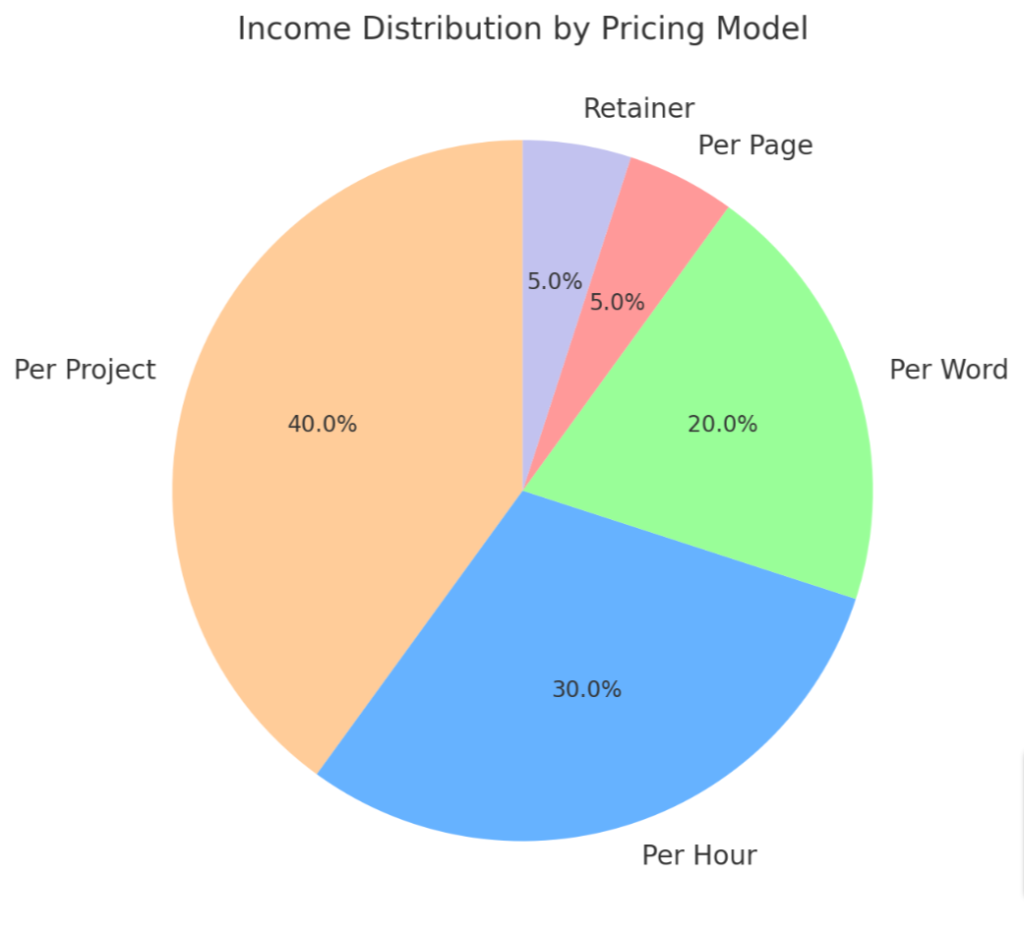Finding Your Worth: Researching Writing Market Rates
Are you a writer curious about how much to charge for your work? You’re not alone; many writers grapple with the question of setting appropriate rates. This blog post will guide you on researching market rates, factoring in various considerations such as project complexity and deadlines, and negotiating fair payment for your writing talent.
Ready to monetize your wordsmith skills? Let’s dive in!
Key Takeaways
- Consider different pricing options for freelance writing, such as flat – rate per project, hourly rates, rates per word or page, and retainer fees.
- Factors to consider when setting rates include the time taken to complete a project, your experience level, the type of writing required, the complexity of the task, the deadline, and the client’s expectations.
- Strategies for finding writing jobs and negotiating rates include researching market rates, building a portfolio to showcase your skills, networking with other writers for job opportunities and industry insights. Set a minimum payment threshold and negotiate rates based on your experience and expertise.
Setting Freelance Writing Rates
When setting freelance writing rates, there are various options to consider such as flat-rate per project, hourly rate, rate per word or page, or even a retainer fee.
By project (flat-rate)
Flat-rate pricing for freelance writing projects is a common method used by writers. This approach involves charging one set fee for the entire project, regardless of the time or effort involved.
Freelancers often prefer this method because it allows them to calculate their earnings upfront and manage their work schedule effectively. Clients favor it too as they know exactly how much they will need to pay, with no unexpected costs cropping up in the process.
To determine a fair flat-rate for a project, freelance writers should consider factors like the complexity and length of the task, their expertise level, and market standards. It’s also crucial to factor in any revisions or editing that may be needed during the project’s lifetime into your price estimation.
By hour
Setting freelance writing rates by the hour is another practical strategy. This method works well for projects that are time-intensive or require extensive research. Hourly rates may vary depending on factors such as experience level, specialty and industry demand.
For instance, a highly experienced technical writer can charge more per hour than a beginner in general content writing.
A critical aspect of setting hourly rates involves accurately estimating the time required to complete different tasks. Writers need to gauge how long it takes them to brainstorm, draft, revise, edit and proofread their work.
They also must factor in non-writing activities like client communication and administration work into their schedules when determining their hourly rate calculations. Regularly reviewing these estimates ensures freelance writers keep pace with changes in market demands while maintaining profitability for each gig they undertake.
By word
Charging by word is a common strategy among freelance writers. It’s an effective way to ensure you’re paid fairly for every piece of work you produce. Each writing job has specific requirements and your fee should reflect this.
Some articles may require extensive research, while others might demand creative storytelling skills – both aspects increasing the value of each word composed. Be mindful not to undervalue your service; researching the average freelance writer rates per word will give you a clearer idea of what’s expected in today’s market.
Use collected data as a basis for establishing competitive content writing rates per word when negotiating new contracts or revising existing ones.

By page
Setting your freelance writing rates by page is another common method used in the industry. Instead of charging per word or hour, you can determine your rates based on the number of pages you write.
This approach works well for longer projects such as eBooks, white papers, and reports that require more time and effort to complete. By setting a fixed rate per page, you can ensure that you are compensated fairly for the work you put into each project.
Remember to consider factors like complexity and research requirements when determining your page rate to accurately reflect the value of your services.
Retainer fee
Freelance writers often have the option of charging a retainer fee for their services. This is a predetermined amount that clients pay upfront to secure the writer’s availability and commitment for a specific period of time.
The retainer fee ensures that the client has priority access to the writer’s work and allows the writer to allocate dedicated time for their projects. It can be an effective way for freelancers to guarantee income and stability while building long-term relationships with clients.
By offering a retainer fee, writers can demonstrate their value, reliability, and professionalism in serving their clients’ ongoing writing needs.
Factors to Consider When Determining Writing Rates
When determining writing rates, freelance writers should consider factors such as the time taken to complete a project, their experience level, the type of writing required, the complexity of the task, the deadline, and the client’s expectations.
Time taken to write
Writing time plays a significant role in determining freelance writing rates. The amount of time it takes to complete a project can impact the overall cost for clients. As a writer, it’s important to consider your own efficiency and speed when setting rates.
Additionally, taking into account the complexity and scope of the project will help ensure that you’re adequately compensated for your time and effort. By estimating how long it will take you to write, you can confidently quote clients with fair rates that reflect both quality and efficiency.
Experience level
As a freelance writer, your experience level plays a crucial role in determining your writing rates. Clients often consider the level of expertise and skill you bring to the table when deciding how much they are willing to pay.
If you’re just starting out as a beginner, it’s important to research market rates for writing jobs to get an idea of what others with similar experience charge. By understanding the average rates in the industry, you can set realistic expectations for your own pricing and position yourself competitively in the market.
Remember that as you gain more experience and build a strong portfolio, you can gradually increase your rates accordingly.
Type of writing
Different types of writing can have varying rates depending on the complexity and specialized knowledge required. For example, technical or scientific writing often commands higher rates due to the expertise needed in those fields.
On the other hand, general content writing or blog posts may have lower rates since they require less specialized knowledge. It’s important to research market rates for each specific type of writing job to ensure you’re charging appropriately for your skills and expertise.
By understanding the market demand and what others are charging for similar work, you can set competitive rates that reflect the value you bring as a writer.
Type of client
The type of client you are working with can greatly affect the rates you charge as a freelance writer. Different clients have different budgets and expectations, so it’s important to consider this when determining your rates.
For example, if you’re working with a small business or startup, they may have a limited budget and be looking for more affordable writing services. On the other hand, if you’re working with larger companies or established brands, they may be willing to pay higher rates for quality content.
It’s important to research the market and understand what other writers are charging for similar projects to ensure that your rates are competitive yet fair based on the type of client you’re targeting.
When setting your freelance writing rates, keep in mind that some clients may require additional services such as revisions or consultations. These extra offerings can also impact your pricing structure.
Complexity of the project
The complexity of the project is another important factor to consider when determining writing rates. Projects that require extensive research, technical knowledge, or specialized expertise tend to be more complex and time-consuming.
As a result, writers may charge higher rates for these types of projects compared to simpler ones. The complexity of the project also impacts the level of effort required, which can influence the overall cost.
Writers need to assess the complexity upfront and factor it into their pricing strategy to ensure they are adequately compensated for their work.
Deadline
Meeting deadlines is a crucial aspect of freelance writing. Clients rely on timely delivery of their content, so it’s important to manage your time effectively and ensure you can meet the agreed-upon deadline.
Keep track of your workload and prioritize tasks accordingly. Use calendars or project management tools to stay organized and plan your schedule. Allocate enough time for research, drafting, editing, and proofreading to avoid rushing at the last minute.
Communication is key – if you foresee any challenges in meeting a deadline, let your client know as soon as possible to discuss alternative arrangements. Stay committed to delivering quality work on time to build trust with clients and secure future opportunities.
Strategies for Finding Writing Jobs and Negotiating Rates
Research market rates for writing jobs to ensure you are offering competitive prices. Build a portfolio to showcase your skills and attract potential clients. Network with other writers to find job opportunities and gain insights into industry trends.
Set a minimum payment threshold to avoid low-paying gigs and negotiate rates that reflect your experience and expertise in the field.
Researching market rates
Researching market rates is an essential step when setting your freelance writing rates. Here are some strategies to help you find the right rates for your writing jobs:
- Identify your niche: Determine what type of writing you specialize in, such as content writing or copywriting.
- Research online job boards: Look for freelance writing job listings on platforms like Upwork, Freelancer, and LinkedIn to see what rates others are charging for similar projects.
- Join professional writing groups: Network with other writers in online forums and social media groups to gain insights into current market rates and industry trends.
- Evaluate competitor websites: Visit websites of other freelance writers within your niche and observe their pricing structures. This can give you a baseline for your own rates.
- Consider geographical location: Keep in mind that rates may vary depending on where you are located. Adjust your rates accordingly based on the cost of living in your area.
- Analyze client budgets: When responding to job postings or negotiating with clients, consider their budget constraints and adjust your rates accordingly.
- Factor in experience level: If you’re just starting out, you may need to charge lower rates initially to build up your portfolio and gain experience.
- Compare different rate structures: Decide whether you want to charge per hour, per word, or on a project basis. Each structure has its pros and cons, so choose the one that suits your preferences and goals.
Creating a portfolio
To effectively showcase your skills and attract potential clients, consider creating a portfolio. Here’s how:
- Select your best work samples that demonstrate your expertise and versatility.
- Organize your portfolio in a visually appealing and easy-to-navigate format.
- Include a variety of writing styles and genres to showcase your range.
- Highlight any notable projects or collaborations you have been involved in.
- Tailor your portfolio to suit the specific needs of each potential client or job opportunity.
- Update your portfolio regularly with new work samples to stay current and relevant.
Networking with other writers
Networking with other writers is a valuable strategy for finding writing jobs and negotiating rates. Here are some effective ways to connect with fellow writers:
- Attend writing conferences or workshops to meet like – minded individuals in the industry.
- Join online writing communities or forums where writers share job opportunities and advice.
- Utilize social media platforms, such as LinkedIn or Twitter, to connect with other writers and potential clients.
- Participate in local writing groups or critique circles to network and gain feedback on your work.
- Collaborate on projects with other writers to expand your portfolio and build relationships.
- Offer your services as a guest blogger or contribute articles to established publications to increase visibility within the writing community.
- Reach out to experienced writers for mentorship or guidance in navigating the freelance writing market.
Setting a minimum payment threshold
To ensure you are being compensated fairly for your writing work, it’s important to set a minimum payment threshold. Consider the following factors when determining your minimum payment threshold:
- Your living expenses
- The value of your time and skills
- The average market rates for similar writing jobs
- The level of experience and expertise required for the project
Conclusion
In conclusion, researching market rates for writing jobs is crucial for freelance writers to set their own rates competitively. By analyzing the competition and industry benchmarks, writers can determine reasonable compensation for their services.
This research allows them to negotiate better rates and attract more clients, ultimately leading to a successful freelance writing career.

